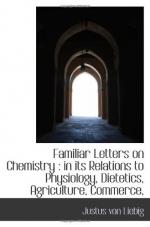A nation of hunters, on a limited space, is utterly incapable of increasing its numbers beyond a certain point, which is soon attained. The carbon necessary for respiration must be obtained from the animals, of which only a limited number can live on the space supposed. These animals collect from plants the constituents of their organs and of their blood, and yield them, in turn, to the savages who live by the chase alone. They, again, receive this food unaccompanied by those compounds, destitute of nitrogen, which, during the life of the animals, served to support the respiratory process. In such men, confined to an animal diet, it is the carbon of the flesh and of the blood which must take the place of starch and sugar.
But 15 lbs. of flesh contain no more carbon than 4 lbs. of starch, and while the savage with one animal and an equal weight of starch should maintain life and health for a certain number of days, he would be compelled, if confined to flesh alone, in order to procure the carbon necessary for respiration, during the same time, to consume five such animals.
It is easy to see, from these considerations, how close the connection is between agriculture and the multiplication of the human species. The cultivation of our crops has ultimately no other object than the production of a maximum of those substances which are adapted for assimilation and respiration, in the smallest possible space. Grain and other nutritious vegetables yield us, not only in starch, sugar, and gum, the carbon which protects our organs from the action of oxygen, and produces in the organism the heat which is essential to life, but also in the form of vegetable fibrine, albumen, and caseine, our blood, from which the other parts of our body are developed.
Man, when confined to animal food, respires, like the carnivora, at the expense of the matters produced by the metamorphosis of organised tissues; and, just as the lion, tiger, hyaena, in the cages of a menagerie, are compelled to accelerate the waste of the organised tissues by incessant motion, in order to furnish the matter necessary for respiration, so, the savage, for the very same object, is forced to make the most laborious exertions, and go through a vast amount of muscular exercise. He is compelled to consume force merely in order to supply matter for respiration.
Cultivation is the economy of force. Science teaches us the simplest means of obtaining the greatest effect with the smallest expenditure of power, and with given means to produce a maximum of force. The unprofitable exertion of power, the waste of force in agriculture, in other branches of industry, in science, or in social economy, is characteristic of the savage state, or of the want of knowledge.
In accordance with what I have already stated, you will perceive that the substances of which the food of man is composed may be divided into two classes; into nitrogenised and non-nitrogenised. The former are capable of conversion into blood; the latter are incapable of this transformation.




